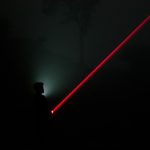Intentionally aiming a laser at an aircraft in flight is a crime under both federal law (18 U.S.C. § 39A) and many state laws (TX Penal Code § 44.14, as one example). Sentences for individuals found guilty of aiming a laser at an aircraft have ranged from fines and probation to serious prison time.  However, you should also be aware that the FAA has the authority to assess a civil penalty against an individual in this situation, in addition to any criminal prosecution that may occur. Recently the FAA did just that, although it ultimately lost the case.
However, you should also be aware that the FAA has the authority to assess a civil penalty against an individual in this situation, in addition to any criminal prosecution that may occur. Recently the FAA did just that, although it ultimately lost the case.
The Case
In the case of In The Matter Of Karen Lynne Stridde, the FAA assessed a $19,375.00 civil penalty against Ms. Stridde (the “Respondent”) alleging that she knowingly aimed a laser pointer at a helicopter which interfered with the helicopter’s crewmembers’ ability to perform their duties, in violation of 14 C.F.R. § 91.11. The Respondent appealed and a hearing was held before a Department of Transportation Administrative Law Judge (the “ALJ”).
At the hearing the FAA had the burden of proving the violation by a “preponderance of reliable, probative, and substantial evidence”, a lower standard than the “beyond a reasonable doubt” standard required in a criminal prosecution. Basically the FAA had to prove that it was “more likely than not” that the Respondent violated the regulation. Fortunately for the Respondent, the FAA was unable to meet its burden.
The ALJ’s Decision
After assessing the credibility of the witnesses, the ALJ found that the laser pointer strikes had interfered with the helicopter’s crewmembers. However, he also determined that the FAA had not proven that it was more likely than not that the Respondent was the individual who hit the helicopter with the laser light or that the laser strikes were done knowingly or intentionally. As a result, the ALJ dismissed the FAA’s claim against the Respondent.
Undecided Issues/Possible Defenses
The ALJ also raised, but did not decide two issues that could be important for future respondent’s in this type of case. First, the ALJ observed that no relevant decisions by the FAA Administrator have been reported involving alleged violations of 14 C.F.R. § 91.11 where the person who caused the alleged interference was not on board the aircraft. He noted that the FAA’s interpretation of 14 C.F.R. § 91.11, not surprisingly, is that the regulation is not limited to alleged violators on board an aircraft, but the interpretation has never been challenged or ruled upon by the FAA Administrator. So, although a respondent would have to overcome the deference an ALJ must show to the FAA’s interpretation of its regulations, this appears to be an ar gument a respondent could make as an affirmative defense in this type of case.
gument a respondent could make as an affirmative defense in this type of case.
Second, the ALJ noted that Congress had directed the FAA to increase the maximum civil penalty for laser pointer violations to $25,000 in Section 2104(b) of Public Law 114-190. However, although the FAA’s sanction guidance in Order 2150.3B (which is not itself a regulation) discusses how to assess civil penalties in laser pointer cases based upon this higher civil penalty allowance, the FAA has not promulgated any regulations to implement this increase. Rather, the existing civil penalty table at 14 C.F.R. § 13.301, which purports to provide “the maximum civil monetary penalties or range of minimum and maximum civil monetary penalties for each statutory civil penalty subject to FAA jurisdiction,” does not include this enhanced penalty for laser pointer cases. As a result, if the FAA calculates the assessed civil penalty in a laser pointer case using this increased maximum amount it may be subject to challenge due to its inconsistency with the current regulations.
Conclusions
Intentionally aiming a laser at an aircraft is a bad idea. Not only is it a crime, but it could also result in assessment of a hefty civil penalty. If you find yourself subject to a civil penalty assessment for allegedly pointing a laser at an aircraft, remember that the FAA has the burden of proof. So, in addition to disputing the facts, you may also have other defenses available to you.
Hopefully you won’t find yourself in this situation. But if you do, give us a call so we can help.


